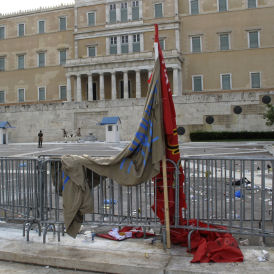Greece tops Lagarde’s IMF agenda as vote looms
Newly appointed IMF managing director Christine Lagarde calls for “national unity” in Greece to push through austerity measures, ahead of a parliamentary vote.

The austerity measures in Greece are a condition of the country’s latest bailout from the International Monetary Fund (IMF) and the European Union (EU). The country needs the money to pay its bills next month and avert the eurozone’s first ever sovereign default.
Greek politicians will vote on whether to pass the bleak economic package, amid protests and strikes over the country’s financial misery which turned violent on Tuesday.
Christine Lagarde, the newly appointed head of the IMF, urged Greece to move quickly just minutes after her appointment was confirmed late on Tuesday.
“If I have one message tonight about Greece, it is to call on the Greek political opposition to support the party that is currently in power in a spirit of national unity,” she told TF1 television.
For parliament to vote against this package would be a crime. The country would be voting for its suicide. Greece central bank governor, George Provopoulos
Ms Lagarde starts her five-year term as managing director on 5 July after previous head Dominique Strauss-Kahn resigned after being charged with attempted rape in New York. He denies the charges.
Fears of international crisis
If Greece defaults, the impact on a jittery eurozone market still pulling itself out of recession could be huge. But the IMF has said it will not pass the next 12bn euro slice of the bailout unless the austerity measures are approved by the Greek Parliament.
Greece is also expected to need another 110bn euro bailout soon. The previous EU/IMF bailout was for a similar amount.
Greece’s central bank governor, George Provopoulos, told the Financial Times that voting against the package would be “suicidal” for the country.
“For parliament to vote against this package would be a crime. The country would be voting for its suicide,” he said.
Several politicians have come forward to say they will back the economic measures, boosting hopes that disaster could be averted.
Shares rose and the euro has held on to recent gains on Wednesday as optimism increased that Greece could avoid economic collapse.